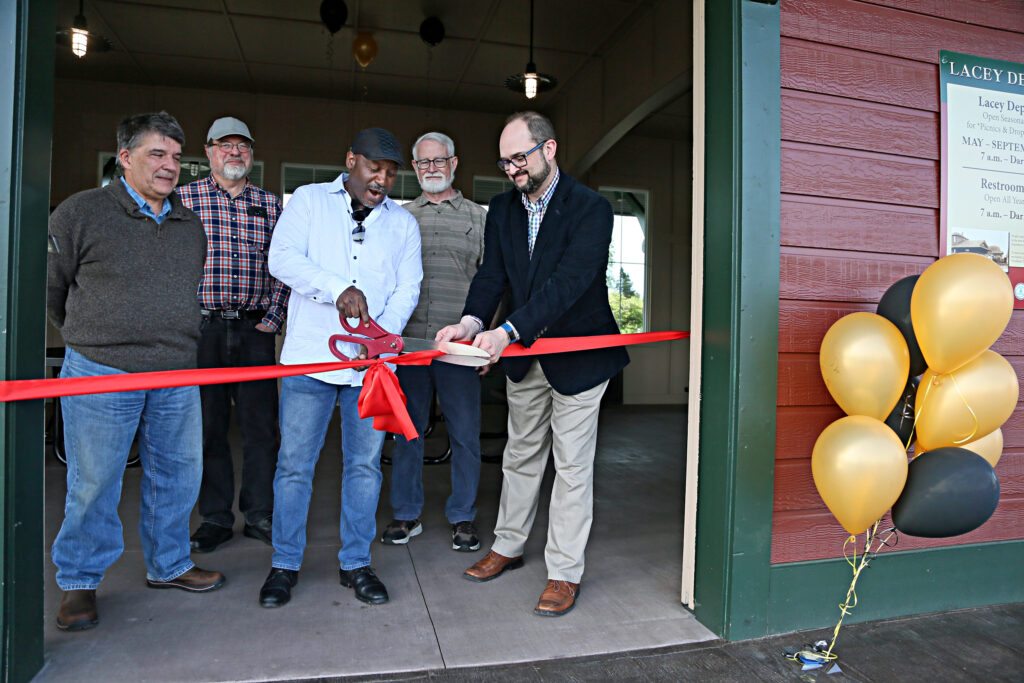Historical Commission Resources

Welcome!
Thank you for joining the Lacey Historical Commission. Your service to the City of Lacey is welcomed and appreciated.
The information provided here will guide you in learning more about the Commission, its work and how you can be an active participant.
Left: Deputy Mayor Malcolm Miller and Historical Commissioners at the Lacey Depot Grand Opening Event, 2022
About the Commission
The Historical Commission was created in 1979 in anticipation of the opening of the Lacey Museum. In 1986, the City adopted the historic preservation ordinance to protect historic properties and in 1987, the State of Washington recognized Lacey as a Certified Local Government (CLG).
Responsibilities of a CLG include maintaining a qualified historic preservation commission, surveying local historic properties, enforcing state or local preservation laws, reviewing National Register Nominations, and providing for public participation in historic preservation activities.
Municipal Code
The duties and responsibilities of the Commission are outlined in Lacey’s Municipal Code.
LMC 2.42 Historical Commission
LMC 16.53 Historic Preservation
The Historic Neighborhood has its own zoning code and design standards; however, the Historical Commission is not a part of the review process. The code is provided here for reference.
Ordinances
Ordinances (local laws) establish Lacey’s Municipal Code. Following are the ordinances relating to the Historical Commission and its duties.
Standards and Policies
These documents provide guidance on the expectations of Commissioners and procedures for Commission actions.
Work Plans and Accomplishments
The Historical Commission meets with City Council annually to review the previous year’s accomplishments and the current year’s work plan.
Lacey History Month
Lacey History Month is celebrated annually in May. City Council makes a proclamation and The Historical Commission awards the Ken Balsley Lacey Historian of the Year Award at a May Council meeting. The Historical Commission may also decide to announce a Pioneer Award recipient.
More information on the Historian of the Year program, including how to nominate someone and past recipients can be found on our website.
Lacey Register of Historic Places
Properties are nominated to the Lacey Register of Historic Places by property owners or interested parties. The Lacey Historical Commission reviews and recommends nominations to the Lacey City Council for designation. The Commission also reviews changes in use for properties on the register or any work done on a register property that requires a building permit. The Secretary of the Interior’s Standards for Rehabilitation, along with the Lacey Municipal Code for Historic Preservation guide the Commission’s decisions.
The properties listed below are on Lacey’s Register of Historic Places.
| Name | ~Built Date | Address | Year Added |
|---|---|---|---|
| Bowker House | 1893 | 915 Bowker St SE | 1991 |
| Gallagher House | 1895 | 823 Lacey St SE | 1992 |
| Ruddell Pioneer Cemetery | 1852 | NE corner of Ruddell & Mullen | 1992 |
| Groom/Turner House | 1929 | 901 Ulery St SE | 1996 |
| Jacob Smith House | 1859 | 4500 Intelco Lp SE | 1998 |
| Huntamer House | 1940 | 834 Lacey St SE | 1999 |
| Lacey Women’s Club | 1936 | 827 Lacey St SE | 2000 |
| Lacey Museum | 1926 | 829 Lacey St SE | 2001 |
| Taylor House | 1936 | 2508 Gwinn Lane SE | 2005 |
| Homann House | 1940 | 1012 Homann Dr SE | 2011 |
| Jensen House | 1928 | 809 Ulery St SE | 2011 |
Training
Open Government Training
Members of City Council boards or commissions are subject to the Open Public Meetings Act (OPMA) and must receive OPMA training no later than 90 days after assuming their duties, as well as completing refresher training at intervals of no more than four years.
The Washington State Attorney General’s Office provides this training in an online format so that it can be done at your convenience. There are five online courses, but you are only required to take three of them: Overview (Lesson 1), Open Public Records Act Basics (Lesson 2), and Open Public Meetings Act (Lesson 3).
Certified Local Government (CLG) Training
The Washington State Department of Archaeology and Historic Preservation (DAHP) has a variety of training slides and videos on their website specifically geared toward Historical Commissions. In addition, if there is a specific topic you would like to know about, the CLG Specialist at DAHP can come to a Commission meeting for a training session.
Lacey Museum
Oversight of the Lacey Museum is an important part of the Historical Commission’s duties and responsibilities. The Commission reviews museum policies, planning documents, new acquisitions and deaccessions (removing items from the museum collection). Commissioners are expected to be a community advocate for local history in general and the museum in particular.
The Lacey Museum’s mission statement was approved by the Historical Commission in 2019:
The Museum enriches our community and engages visitors by sharing vibrant stories of the past through the preservation and celebration of Lacey and the South Sound region’s cultural heritage.
Policies & Planning
The Lacey Museum policy manual was completely revamped as a joint effort between museum staff and the Historical Commission. The final draft was approved in 2018.
The Historical Commission annually reviews and updates the museum’s strategic plan.
Exhibits, Services & Programs
The Lacey Museum fulfills its mission to the community by providing education and experiences related to local and regional history. The museum website offers a wealth of information about its services and programs. Below are links to just a few of them.
Staff is working on a new website section that will be called “Virtually Lacey” and will feature articles on historical residents and places. An example of what is to come is this entry: Where Did the Name Lacey Come From?
New Museum Project
The new museum project has been in the works for over a decade. The Historical Commission has played and will continue to play an important role in the development of the site. Get the latest, see the renderings, or learn about the project’s history on the project page.
The Lacey Depot and adjacent train-themed playground, which opened to the public in 2021, will become part of the new museum campus when it opens.
Parks, Culture & Recreation
The Historical Commission is one of two advisory bodies overseen by the Parks, Culture & Recreation Department.

 Ordinance 531 – Creating a Historical Commission (1979)
Ordinance 531 – Creating a Historical Commission (1979)